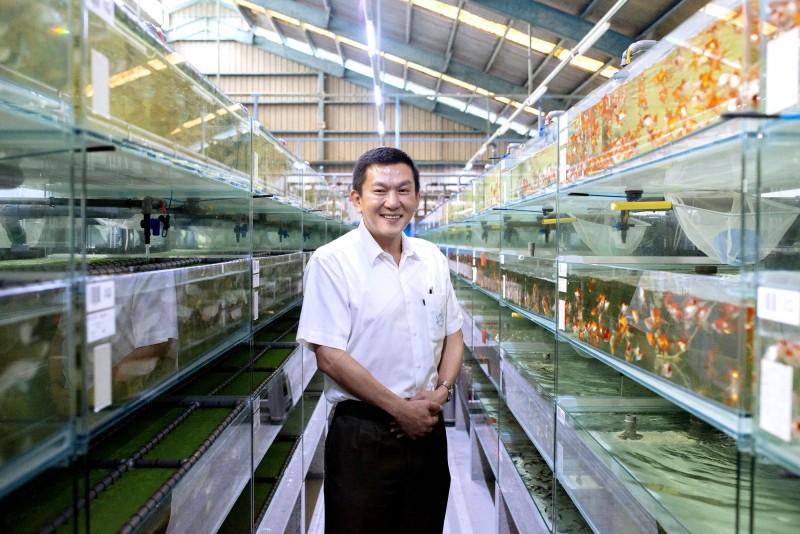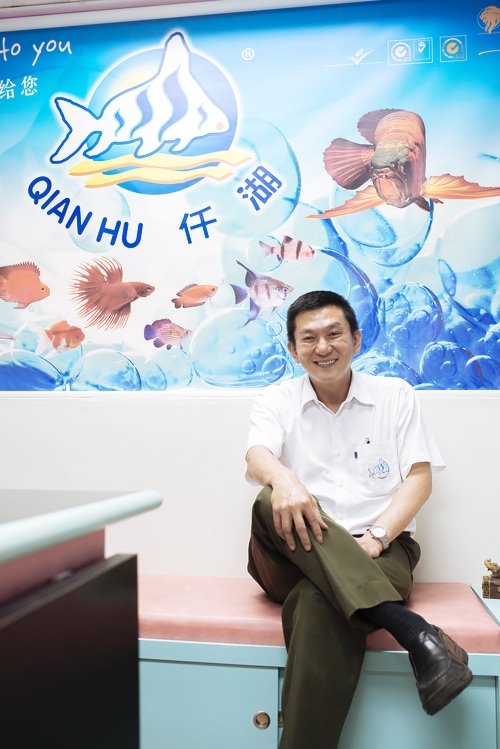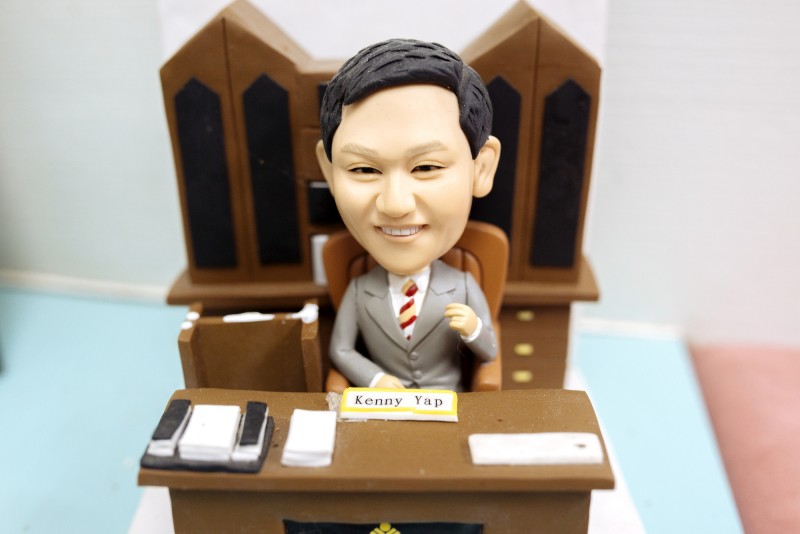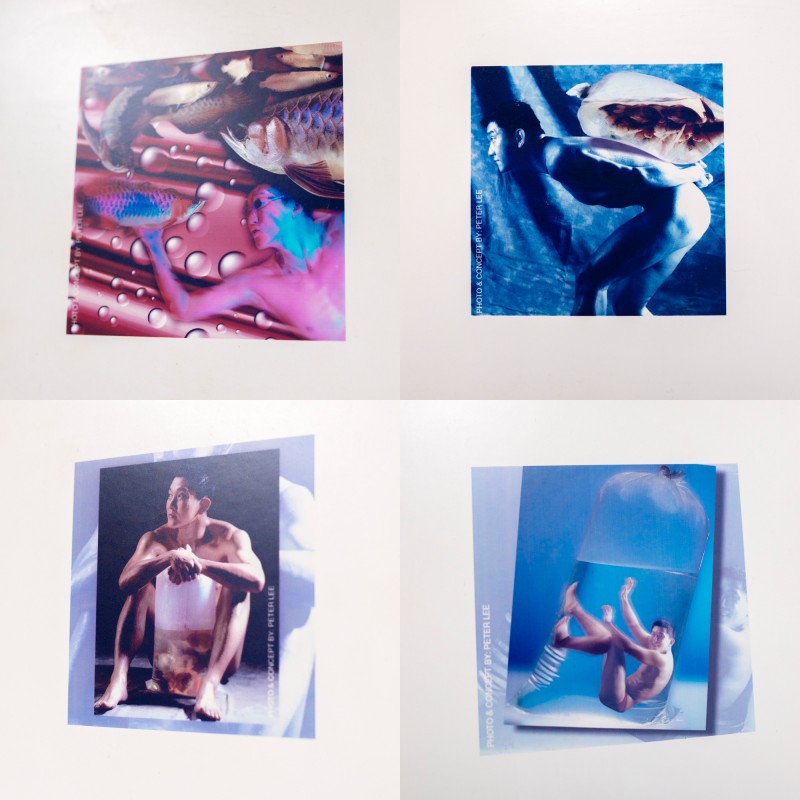The Lenovo desktop computer is the shiniest object in the room. The rest of the room transports you back to the 1990s. The pasty walls hold old photographs of Kenny Yap, including the famous ones of him in various almost-nude poses. We greet and make opening chatter. “Mind if I smoke?” he asks gruffly. The affable head of Singapore’s largest ornamental fish exporter wasn’t really asking, I suspect. I oblige. “Of course – it’s my office, right?” he replies in the same tongue-in-cheek tone as the photographs hanging over him. I oblige further with a chuckle. “I had a bad flu yesterday with a fever, and I’m not fully recovered,” he adds.
The old furniture is in a shade of light blue, and reminds me of an old GP’s clinic. The size of the room isn’t what you’d expect of a CEO’s office whose company has an annual turnover of close to S$100 million. You cannot even pace around in a full circle here. It was as though a Pac Man level had been mistakenly used for the room’s layout. The company’s logo, plastered across the end-to-end window pane, is the dominant article, representing the integral role the company has played in his adult life. It’s even peeling off in some places.
As we converse, some topics rile him up. Then, he will rest a hand on his hip, sit up and point with a sturdy index finger, as if prepping for war – which he had been through. In the early days, the company had suffered many setbacks, one of which technically brought it to bankruptcy. His family’s reputation saved the young firm. “People we owed money to, knew that somehow, we’d pay them back so they did not really go after us,” he recounts.
One thing that’s unmistakable is how grateful he is to his family. Calling himself a country boy, he stresses the importance of never forgetting one’s roots. A large signage hangs outside: ‘… Small fish have to swim together. Without my four brothers and two cousins, I don’t think there would be a Kenny Yap…’ And it’s not just his family he thanks, he considers his employees part of what he calls ‘Qian Hu Family Members’, regardless of who they are, and where they come from. Motivational posters pepper the grounds so his family members are always reminded of Qian Hu’s modus operandi, one of which is: “Run the business based on discipline and not mood”. The bachelor loves swimming, snorkelling, scuba-diving, singing… “Anything that starts with ‘S’,” he helpfully summarises for me. He misses out smoking. As I thank him for taking the time despite his illness, he assures me, “I’d probably be livelier if I wasn’t sick.”
Conversations with Kenny Yap
YONG HUI YOW: What happened in the beginning?
KENNY YAP: My father and my uncle were originally pig farmers. Then, in the late 1970s, and early 80s, the government considered pig farming a polluted industry. They also wanted to acquire more land for public housing. So, they slowly phased out pig farming as a viable industry. Thus we had to change the business, and my family decided to use the existing infrastructure to breed guppies. You know, 13, 14 years ago Singapore was called ‘The Guppies Kingdom”.
YONG HUI: Why was that?
KENNY: Guppies were introduced by the British to South East Asia to eat larvae, but the local fish farmers were very creative. They came up with many varieties. My brother learned from his friend how to breed them, and we transitioned the pig farm to breed guppies.
YONG HUI: How did the transition go?
KENNY: We encountered a lot of setbacks. We had to move from Sembawang to Lim Chu Kang. In 1989, there was a very heavy rain which lasted 3 days. The rain washed away all our guppies when the river overflowed. Our primitive concrete ponds, which we used to house our guppies, could not cope with the deluge.
YONG HUI: How did you bounce back?
KENNY: For Chinese people, if you lose confidence in one place, you try to find it back from somewhere else. Usually, we talk to God or a geomancer. Since we were going to be in the freshwater business, the geomancer said, “Maybe you should change your name to Qian Hu”, which means ‘Thousand Lakes’ in mandarin. We were called ‘Yap Brothers Fish Farm’ before that.
YONG HUI: Are you a superstitious person?
KENNY: I’m not. But religion, or anything that gives people confidence is good. If you use religion to build confidence, to have faith in yourself, or to do good deeds, I think that’s perfectly alright. However, if you use religion to do evil or self-righteous things at the expense of others – that I consider wrong.
YONG HUI: Are you religious then?
KENNY: I’m a free-thinker, but my family members are Buddhists or Taoist. I can’t differentiate between them. One thing I treasure, however, is tradition and ancestor worship, which reminds me of my roots. I always remind myself that I’m a country boy from the countryside. We came from a very poor family, so I really appreciate everything I have right now.
YONG HUI: How did you end up joining the family business?
KENNY: I was in the US, pursuing my degree, and came back in 1990. I did not immediately join the family business partly because they were busy reconstructing the farm. The other part was that I wanted to have some corporate experience. I had several offers including from Singapore Airlines, Proctor & Gamble… but I chose to join Tat Lee Bank. Two and a half months later, I resigned.
YONG HUI: Why?
KENNY: My boss treated me very well, and gave me a lot of chances to learn, but I didn’t enjoy my life there. That was the most pathetic period of my life. That experience made me realise that I need to define the game, the room to think, and a space to make rules for myself, rather than conform to a set of pre-defined rules.
YONG HUI: Why was the experience ‘pathetic’ though?
KENNY: Anything that requires me to conform, such as working for a big corporation with their own structures and rules, makes me extremely uncomfortable. At that time, I had slip disc and had to undergo an operation, so I used that as a reason to resign. Some people suggested to me back then, “Why don’t you make use of the medical insurance the company has for the operation, and after that, if you really want to resign, then you resign.” I rejected it because my father taught me to not take advantage of others.
YONG HUI: After resigning from Tat Lee Bank, you joined the family firm?
KENNY: After I recovered from my operation, I had a discussion with my family that once I could walk, I’d start helping out.
YONG HUI: If you had stayed on at the bank, what might have happened?
KENNY: If I had stayed and worked very hard, I might have been one of the bankers who caused the crisis in 2008! But that was not my cup of tea. I did not enjoy it at all.
YONG HUI: How did you learn the ropes after you joined the family business?
KENNY: After I joined, one of my brothers had learned from a friend how to rear the ‘High Fin Loach’. The idea was that we could make a lot of money with it. So we brought in close to 4,000 pieces, each piece costing over S$150. We thought that after a few months, we could sell them and make a fortune. What we didn’t know was that this species is very sensitive to its environment. When we were building more tanks to house the fishes, the vibrations from the construction killed them all. That was a really big setback. We were technically bankrupt, and owed many people money. Our fishes had died so we couldn’t sell them.
YONG HUI: How was that resolved?
KENNY: We were at a crossroads. For me, I could simply go back to Tat Lee Bank, or to other companies. My four brothers, most of them did not even finish their PSLE. They had followed my father to rear pigs – where can they go? That was one of my considerations. Another consideration was that rearing fish has always been my passion. It’s important to find your passion. Nowadays, we get too influenced by advertisements and people around us. When I was 4 or 5, I bought a goldfish with a broken tail. My brothers laughed at me and said I was stupid to spend 50 cents to buy a fish with a broken tail. But I didn’t care. My definition of a good fish is: As long as you like it, it’s a good fish.
YONG HUI: How did the business turnaround after that?
KENNY: We made many mistakes. One, we were greedy. We wanted to be rich overnight, or within a few months. Most people become financially independent because they put in a lot a lot of hard work and for prolonged periods of time. Behind the scene, they have spilled blood and tears. You need very hard work, for very long periods of time. We didn’t do that. We thought a few months were sufficient. Second, we put all our eggs in one basket. We bet only on one type of fish. Third, we forgot to be a learner and became complacent. We knew how to breed guppies, but not necessarily the ‘High Fin Loach’. If you have the right attitude to continue learning new things under new circumstances, you can make it. With these mistakes and lessons in mind, we reorganised the whole business portfolio.
YONG HUI: How did the Arowana come into the picture?
KENNY: So as we reorganised, one of my brothers learned how to manage the farm. I was in charge of exports. Another cousin learned how to do aquarium accessories. Another brother learned how to breed the Dragon Fish. He learned it from a friend, and we added it into our portfolio.
YONG HUI: Financially, how did the company survive?
KENNY: My family had very good reputation, which my father and uncle built over the years, and it gave people confidence. People we owed money to, knew that somehow, we’d pay them back, so they did not really go after us. No bank would lend us money, so we took loans to tide us over. We relied on reputation and we progressively paid off our debts.
YONG HUI: If you did not have your family business, might you have gone off to start something anyway?
KENNY: I might. It would depend on the people I encounter, and what kinds of ideas come to me in the toilet. Definitely, I’d do something, but not working for other people for sure. I might also fail more times before making it. I think I’m very lucky because I had my family members, and together, we could create something. I might not be that lucky no matter how smart I’m.
YONG HUI: Tell us about the logo.
KENNY: After the High Fin Loach incident, the subsequent lessons were not as detrimental. We had many setbacks along the way, but none of them could pull us down when we were reminded of that incident. So we decided to use the fish as our logo to never forget the lessons.
YONG HUI: Why did you decide to go public?
KENNY: Our business had picked up, and one thing led to another. For me, I wanted more transparent structures to separate ownership and management. Transparency was a key reason. In family-run businesses where there are many shareholders, having proper structures is important for good governance. Within the family, we also needed some discipline, and transparency helps. Nomura was interested in investing in Qian Hu, but I did not accept it. In the process however, I became good friends with their fund manager. They said, “You have potential, but you need to do business planning.” They introduced me to Arthur Anderson, and we started to do serious business planning. Eventually, they suggested that we can go public. In 1998, we formally incorporated the company, whereas previously we were a partnership. Two years later, we listed the company. The day after we listed, I asked my family, “Do you feel the difference?” They said “no”.
YONG HUI: Do family businesses have a harder time planning for succession?
KENNY: Succession is difficult and challenging. That’s why the process must start early. Big corporations have enough people, and they can always bring in more people. With family businesses, there are two groups of people to consider. One, are the professionals working within the company. Second, are family members working within the company. My way is to form a succession team from these two groups, not choose a successor. The succession team will choose their leader themselves, regardless of whether they are from the family.
YONG HUI: So the next CEO might not be from your family?
KENNY: I want someone from within the organisation, and who has been within the organisation for some period of time. I do not believe in helicopter-ing someone in to take over. The answer is I don’t know, but in five years, you should know. By 2020, I’ll still be Executive Chairman but my CEO role will go to the new person.
YONG HUI: What are the values of Qian Hu?
KENNY: Teamwork, Integrity, Entrepreneurship and Innovativeness. I expanded the definition of family members to include everyone working at Qian Hu, regardless of surname, race, gender, nationality. As long as you are part of these core values, you’re part of the family. We let people make mistakes, but please don’t keep making the same mistake. If you make the same mistake twice, it becomes a stupid mistake –but please make mistakes. With mistakes, you gain experience, and with experience, you become wiser.
YONG HUI: What do you not tolerate?
KENNY: Politics. If you want to play politics, please become a politician. Don’t work at Qian Hu. Politics kills the joy of working in any organisation.
YONG HUI: What kinds of people do you avoid?
KENNY: People who promise you the sky. Those who talk a lot and promise the sky usually have no substance. This is one thing I have realised over the years. When people talk too much, I get scared. I also cannot stand people who don’t respect their workers. I have a soft spot for foreign workers, especially low-paid construction workers. If I see people ill-treating them, I won’t work with them. Any worker who comes in becomes part of your family. If you treat them as though they owe you a living… it’s not right.
YONG HUI: What are the downsides of family businesses?
KENNY: Emotions. You see, in a professional environment, there is no emotional element involved. In a family-run business, when you go back home, you still have to deal with it.
YONG HUI: You are the youngest child. It is unusual for you to take over.
KENNY: First of all, I’m very lucky that is the case. I’ve always been fair and transparent to my elder brothers, and I put their interests before me. As a result, they trust me with a lot of things. I give them a certain level of comfort and confidence.
YONG HUI: What is your management style?
KENNY: I want people to respect what I do. Any leader who wants to be popular cannot do the right things. Certain right things are not popular. I’m not running for a popularity contest. I’m not a politician; I do not need votes. Plus, my character is such that I do not care how people see me. If you always live in other people’s opinion, you will lose yourself. You must know how to define yourself. I know who I’m; I know what I’m doing. I don’t care about your opinion; I don’t need your approval.
YONG HUI: Do people eat Arowana?
KENNY: Not so much so, mostly because of the price, but all fish were meant to be eaten either by larger fish or by man. This was before we started keeping fish as pets. But, I heard that Arowana does not taste very good. Freshwater fish usually do not taste very good due to an earthen smell, except for sand gobies and soon hock, which taste quite nice. But I don’t know – I have not tried.
YONG HUI: What other hobbies do you have?
KENNY: I enjoy playing mahjong with my neighbours, in-laws and friends. I truly enjoy reading. I’m such an avid reader that when people call me when I’m reading, I won’t know how to respond. Sometimes, I read past 3 or 4 am, and I’d have an 8am meeting. Reading also helps me pass time on planes because I cannot sleep on planes. I like to experience new things, tastes, food – that’s why I cannot get married… I might get bored quickly.
YONG HUI: What do you like to read?
KENNY: I read all the LKY books, Jack Welch and Michael Porter books. I also like to read Freakonomics. I like what the author observes and concludes, such as, why crime rates suddenly decline. Oh! They realised that it’s because some years ago, they legalised abortions. So, if you force parents to keep the child, and they neglect the child, the child grows up more likely to commit crime.
YONG HUI: The government once said that fish farming is a sunset industry. Do you feel like you have proved them wrong?
KENNY: For the past 20 years, the government has stopped saying that. They have realised one thing: there is no such thing as a sunset industry. Sunset in Singapore is sunrise elsewhere – the sun does not set. Only the mind sets. Companies can transform, so don’t say this is sunset or sunrise. All businesses go through cycles – like property. You should engineer many shades of colours, and let a thousand flowers bloom. Help them along the way, but don’t condemn companies and industries.
YONG HUI: You appeared in Ah Boyz to Men right? How was that experience?
KENNY: Ah, I was supposed to appear but I was sick on the day. I know! They still put my name up. Jack Neo is a close friend of mine, and they wanted some officers to star in the show.
YONG HUI: Why should people have fish as pets over dogs and cats?
KENNY: Keeping fish is one of the easiest things to do. The fish is contained in a tank or pond. Fish also cuts across religions and ages. Some religions don’t allow you to keep dogs. If I’m not wrong, keeping fish is the second most popular hobby besides photography. We sell cat and dog food though, and they comprise a large percentage of our pet foods sales. The evolution of equipment follows the changing lifestyles of people. The less time people have, the less they want to maintain. So we try to come up with increasingly innovative products all the time. Eventually, I want to come up with something hassle-free. We understand people’s time constraints and we want to help them still be able to keep healthy fish.
YONG HUI: What is innovation in fish-farming?
KENNY: There are many ways. We are about to complete an overhaul of our infrastructure. Soon, we will use hydro technology for filtration. The whole idea is to run a high-tech farm and let the system take care of the fish, so I don’t need people to do that. They should just count the fish and sell. I wouldn’t need people to change water and all that. We are about 60 per cent complete. By the end of this year, the whole farm will run automatically. Hydro filtration also retains the minerals and the good stuff. You can also innovate in the packing system, computer bar-coding all these. You can also innovate in supply chain and customer relationship management.
YONG HUI: What is innovation to you?
KENNY: Innovation is about finding new ways of doing things, or find new things to do. Most of the time is the former. People don’t want to innovate because they are lazy. You have to invest in a lot of knowledge acquisition, R&D, trying out new things, new systems, learning from many different sources.
YONG HUI: Will these new technologies reduce your need for workers?
KENNY: If I want to increase capacity by 2 or 3 times, I would not have to increase my workers by the same proportion. I become more scalable, but I’d still need workers.
YONG HUI: What do you want Qian Hu to become?
KENNY: Our vision for the next few years is to be the number one ornamental fish exporter in the world. It’s a very niche and small industry, but if you can be the world number one – feels good right?
YONG HUI: What are the things which will continue to set Qian Hu apart?
KENNY: We are innovative. For example, the system we have created can be applied to aqua-culture. Recently, our offshore farming operations have had plankton and algae problems. If we can bring it indoors using our system, we can penetrate into aquaculture too.





